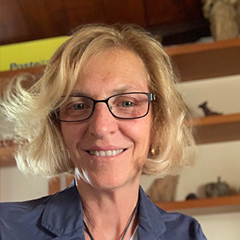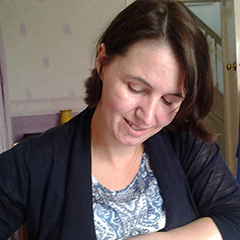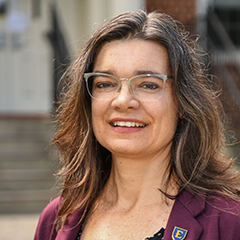
Anna de Fina, Georgetown University, Professor and Chair, received an M.A. in Linguistics from Esculea Nacional de Antropología e Historia in Mexico, a Master of Philosophy in Linguistics from Cambridge University (U.K.), and a Ph.D. in Linguistics from Georgetown University. In 2004 she joined the Georgetown Faculty where she is currently Professor of Italian Language and Linguistics in the Italian Department and affiliated professor with the Linguistics Department. Her interests focus on narrative, discourse and identity, immigrant and transnational communities, Italian American studies and superdiversity. Among her publications are Analyzing Narrative: Discourse and Sociolinguistic Perspectives (Cambridge University Press, 2011) co-authored with Alexandra Georgakopoulou, Identity in Narrative (2003, John Benjamins). She has edited collections Handbook of Narrative Analysis (2015, Wiley Blackwell), with Alexandra Georgakopoulou and Discourse and Identity (2006, Cambridge University Press), with D. Schiffrin and M. Bamberg. She is co-editor of the Series Encounters, for Multilingual Matters. Expertise: Discourse, Identity, Italian, Narrative, Sociolinguistics. Research interests: The construction of identity through language practices, Identity and narrative, code-switching and translanguaging, migration, transnational communities and superdiversity.

Paul Baker’s research interests include corpus linguistics, language and identities and (critical) discourse analysis. He has worked at the University of Lancaster. His books include: Using Corpora to Analyse Gender (2014), Discourse Analysis and Media Attitudes (2013), Corpus Linguistics and Sociolinguistics (2010), Sexed Texts: Language, Gender and Sexuality (2008), Using Corpora in Discourse Analysis (2006). He is the commissioning editor for the journal Corpora. He has devoted much attention to methodological issues, focusing on triangulation in qualitative research, on which he cooperated with Jesse Egbert resulting in the following two books: 2019. Using Corpus Methods to Triangulate Linguistic Analysis (2016, Routledge) and Triangulating Methodological Approaches in Corpus-Linguistic Research (2018, Routledge).

Jo Angouri is currently the Academic Director for Education and Internationalisation at the University of Warwick. She received her PhD from the University of Essex and upon graduation got first job with UWE’s Bristol Centre for Linguistics. After 5 years she moved to the University of Warwick and the Centre for Applied Linguistics. She has been a visiting scholar in different institutions in New Zealand, Australia and Europe. She is Visiting Distinguished Professor at Aalto University, School of Business, Finland and a Visiting Professor (Affiliate) at Monash University, Australia. She is the founding editor of the Multilingual Matters’ Language at Work series and is also co-editing Discourse Approaches to Politics, Society and Culture for John Benjamins. Jo Angouri does research at the interface of sociolinguistics, pragmatics and discourse analysis. She is committed to multidisciplinarity and her research interests include workplace interaction (corporate/health); multilingualism, diversity and migration and language and politics.

Karin Tusting, Lancaster University, is interested in how contemporary social practices are mediated through interaction with written texts, including electronic texts. She studies various aspects of this textual mediation process, drawing on linguistic ethnographic methodologies to study literacy practices. She was Principal Investigator on the ESRC-funded research project “The Dynamics of Knowledge Creation: Academics’ Writing Practices in the Contemporary University Workplace” (book of the project was published with Routledge 2019). She is interested in the field of linguistic ethnography and has been convenor of the Linguistic Ethnography Forum for the past 5 years. She has recently edited the Routledge Handbook of Linguistic Ethnography (Routledge 2019).

Trena Paulus is a Professor in the Department of Family Medicine Research Division at East Tennessee State University. She was a Professor of Qualitative Research Methods at the University of Georgia from 2014-2019 and an Associate Professor in the Educational Psychology department at the University of Tennessee from 2003-2014. She is a certified professional trainer for ATLAS.ti and co-author of Looking for Insight, Transformation and Learning in Online Talk (Routledge, 2019) and Digital Tools for Qualitative Research (Sage Publications, 2014.) Dr Paulus has published over 60 peer-reviewed journal articles on topics related to qualitative research, language-based methodologies for investigating online conversations, computer-mediated communication and online learning.

Lisa elRefaie is a professor at the University of Cardiff. She is the author of Autobiographical Comics: Life Writing in Pictures (2012), which was shortlisted for the Will Eisner Comic Industry Awards 2013 (Best Scholarly/Academic Work category). Her second research monograph, Visual Metaphor and Embodiment in Graphic Illness Narratives, was published with Oxford University Press in 2019.
She is an expert on metaphor studies, and – in terms of methodology – on multimodality and visual research.

Christine Mallinson is Professor of Language, Literacy, and Culture, Director of the Center for Social Science Scholarship, and Affiliate Professor of Gender and Women Studies at UMBC in Baltimore, Maryland, US. An expert on language and educational inequality, Dr. Mallinson’s interdisciplinary and collaborative research comprehensively examines language as a socially and culturally embedded phenomenon. She is the co-author of Understanding English Language Variation in U.S. Schools (2011) and We Do Language: English Language Variation in the Secondary English Classroom (2014) and is the co-editor of Data Collection in Sociolinguistics: Methods and Applications (2nd edition, 2018) and Rural Voices: Language, Identity, and Social Change across Place (2018). She currently is chair of the Ethics committee of the Linguistic Society of America and serves on the editorial board of the journals American Speech, Language & Linguistics Compass, and Voice & Speech Review.

Jessica Nina Lester is an Associate Professor of Inquiry Methodology (Qualitative Research) in the School of Education at Indiana University, Bloomington. She has published numerous books and book chapters, and articles focused on discourse and conversation analysis, disability studies, and works related to qualitative research. She is a co-author of the first edition of Digital Tools for Qualitative Research, published with SAGE. She has also co-edited a book focused on performance ethnographies (Peter Lang, 2013) and is currently co-authoring a book focused on applied conversation analysis with SAGE. Dr Lester has also co-authored a research methods textbook with SAGE (An introduction to educational research: Connecting methods to practice). She is a founding member of the Microanalysis of Online Data international network.
© 2023 All Rights Reserved